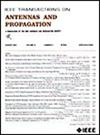A Full Design Perspective of Port Decoupling for MIMO Antennas: Preservation of Radiation Pattern
IF 4.6
1区 计算机科学
Q1 ENGINEERING, ELECTRICAL & ELECTRONIC
引用次数: 0
Abstract
Whereas most studies of decoupling methods in antenna designs are limited to port isolation, this article additionally investigates the radiation-pattern-decoupling (RPD) method to preserve the radiation pattern in a port-decoupling design. The RPD method introduces shorting vias to obtain a new current component for canceling the coupled current, leaving the original active current on the coupled antenna element. As a result, each element effectively has its own active current only, minimizing the coupling effects on the antenna port and radiation pattern. For demonstration, this RPD method is applied to an multiple-input multiple-output (MIMO) design using broadside microstrip antennas (MAs). BothMIMO天线端口解耦的完整设计视角:保持辐射方向图
鉴于天线设计中大多数解耦方法的研究仅限于端口隔离,本文还研究了辐射方向图解耦(RPD)方法,以保持端口解耦设计中的辐射方向图。RPD方法引入短路过孔,得到一个新的电流分量来抵消耦合电流,使耦合天线元件保留原有的有源电流。因此,每个元件有效地只有自己的有源电流,最大限度地减少了对天线端口和辐射方向图的耦合影响。为了演示,该RPD方法应用于使用宽频微带天线(MAs)的多输入多输出(MIMO)设计。考虑了$1\ × 2$和$4\ × 4$ MIMO阵列,测量结果与模拟结果基本一致。两种阵列均具有重叠阻抗,隔离带宽均大于5%,部分隔离度均大于16.5 dB。
本文章由计算机程序翻译,如有差异,请以英文原文为准。
求助全文
约1分钟内获得全文
求助全文
来源期刊
CiteScore
10.40
自引率
28.10%
发文量
968
审稿时长
4.7 months
期刊介绍:
IEEE Transactions on Antennas and Propagation includes theoretical and experimental advances in antennas, including design and development, and in the propagation of electromagnetic waves, including scattering, diffraction, and interaction with continuous media; and applications pertaining to antennas and propagation, such as remote sensing, applied optics, and millimeter and submillimeter wave techniques

 求助内容:
求助内容: 应助结果提醒方式:
应助结果提醒方式:


